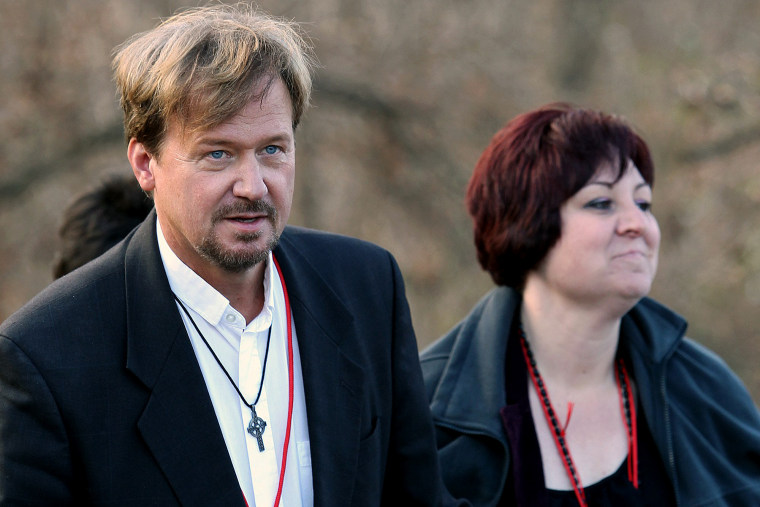Updated: 9:30 p.m.
A United Methodist pastor found guilty of violating church law for marrying his gay son to another man gets to keep his ordination credentials--for at least the next month.
Rev. Frank Schaefer of the Zion United Methodist church in Lebanon, PA., was convicted in a church trial on Monday of officiating at a gay wedding and showing "disobedience to the order and discipline of the United Methodist Church.” His punishment could have ranged from a mild reprimand to being defrocked.
Instead, a jury of his fellow clergy members sentenced Schaefer to a 30-day suspension, and said that if, at the end of 30 days, Schaefer still refused to uphold church doctrine, he would have to surrender his credentials. The likelihood of Schaefer promising to never again officiate a same-sex wedding, however, is slim--three of his four children are gay.
Nevertheless, Schaefer said in a statement he was "relieved" to have received a lighter penalty than defrocking.
"I gave the jury every excuse to take my credentials when I was honest with them and said that I must continue to serve all people--no exceptions," said Schaefer. "The jury went with the defense's plea for a lesser penalty, a decision which acknowledges the diversity of opinions within the United Methodist Church and provides a path towards healing."
In many ways, defrocking was a consequence Schaefer had already accepted when he went against the Methodist Book of Discipline to preside over his oldest son's 2007 wedding in Massachusetts, which on Monday celebrated 10 years of marriage equality. The pastor's son, Tim Schaefer, struggled with depression and suicidal thoughts before coming out to his parents when he was 17 years old.
“I did not want to make this a protest about the doctrine of the church,” said Schaefer in his opening remarks on Monday. “I was ready to choose between my son and my career.”
Schaefer’s trial is the first since the 1,000-member General Conference in 2012 reaffirmed the United Methodist Church’s policy on homosexuality, which accepts gay and lesbian members but considers the practice “incompatible with Christian teaching.” Soon after states began legalizing same-sex marriage, the church implemented a rule barring Methodist pastors from officiating at gay unions.
Speaking before a jury of 13 clergy members during the penalty phase of his trial Tuesday, Schaefer criticized the Methodist Church and said it needed to “stop judging people based on their sexual orientation.”
“We have to stop the hate speech,” he said. “We have to stop treating them as second-class Christians.”
The prosecution called for a penalty “severe enough” to scare other clergy members from breaking the covenant.
Schaefer said he was frank with his superiors about his plans to officiate his son’s wedding, and received no reprimand. In April, about a month before the church’s statute of limitations was due to expire, Jon Boger, a member of Schaefer’s congregation, filed a complaint.
“He kept it silent from the congregation. Nobody knew,” said Boger in his testimony Monday. “It was a lie and a broken covenant.”
Dozens of Schaefer’s supporters were on hand outside the hearing in Spring City, PA., Monday and Tuesday, protesting both church doctrine and church trials, which opponents feel have turned into an overused and ineffective tool for dealing with the rapidly developing civil rights issue. Church law can be changed only at the worldwide General Conference, which next convenes in 2016. But some are calling for the Council of Bishops to put a moratorium on trials until a more thorough conversation can take place.
"There's no opportunity for any dialogue with church trials," said Thomas E. Frank, a professor at Wake Forest University. "It's turned into a legal process, and it's silencing many people whose disagreement is growing rapidly."
There were only a handful of church trials between the years 1998 and 2011 for Methodist clergy accused of performing same-sex weddings, or of coming out as gay themselves. But the last couple years have seen five new potential cases emerge, including two other pastors who performed their gay children's weddings, and a retired bishop--the only one to have ever publicly presided over a same-sex ceremony.
Views on human sexuality are by no means uniform across the United Methodist Church, a reality acknowledged by the Council of Bishops in its statement calling for charges against retired Bishop Melvin Talbert, who on Oct. 26 married two men in a symbolic ceremony in Alabama, a state that bans same-sex marriage.
"The Council recognizes the deep divisions and pain in our church over these issues," read the statement. "United Methodists are not of one mind, and followers of Christ and people of conscience hold conflicting views. These issues require continuing honest and respectful conversation as well as prayer throughout the church."
But "bishops are also required to 'uphold the discipline and order of the Church...and to share with other bishops in the oversight of the whole church,'" the statement continued. "When there are violations of the Book of Discipline, a response is required."
Critics argue that church trials stifle conversation and intimidate clergy members from coming forward with different points of view. Once tried, however, Rev. Schaefer was able to show his true colors--manifested, in this case, in a rainbow stole--and declare in his closing statement he could no longer be a "silent supporter."
"I must continue to be in minsitry with all people and speak for LGBTQ people," he said. "Members of the jury, before you decide my penalty, you need to know I wear this rainbow stole as a visible sign that this is who I am called to be."
Reuters and the Associated Press contributed to this report.
